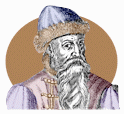 |
||
 |
    |
 |
 |
||
 |
    |
 |
 |
Johannes Gensfleisch Gutenberg was born in Mainz, Germany in 1397, and began his life as an inventor by studying metallurgy in Strasbourg. His first creations were trinket mirrors to be sold to religious pilgrims. Through this experience he learned that there was a highly profitable market among the faithful for Church-related products -- most significantly, the indulgence. |
 Sources for the timeline and accompanying information.
Sources for the timeline and accompanying information.